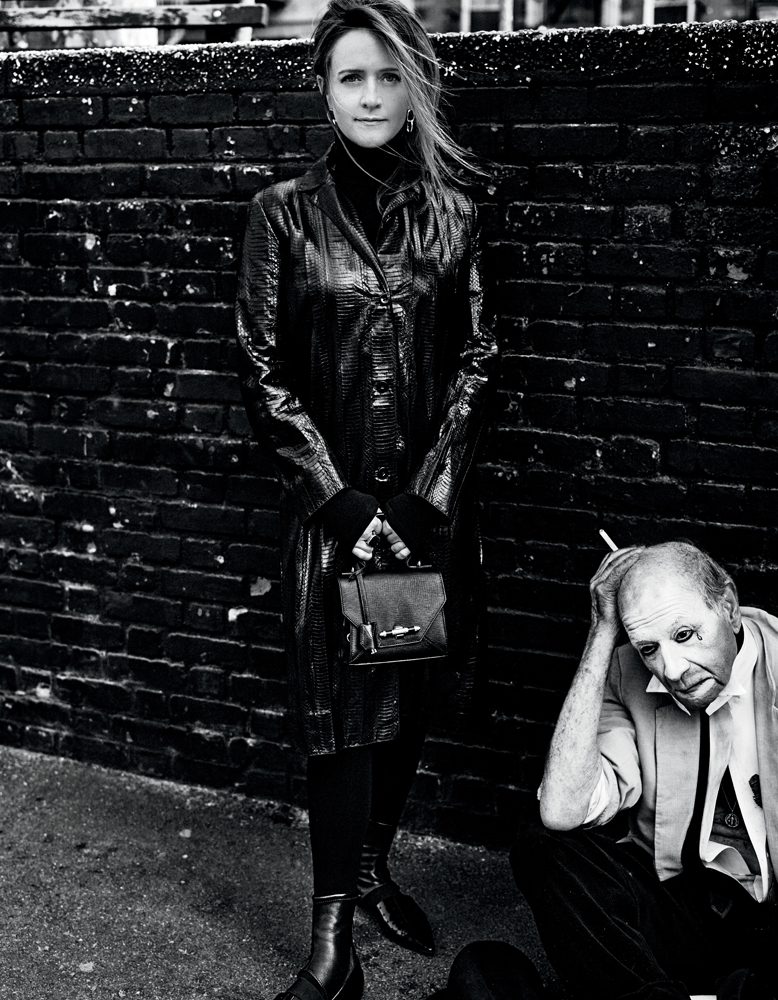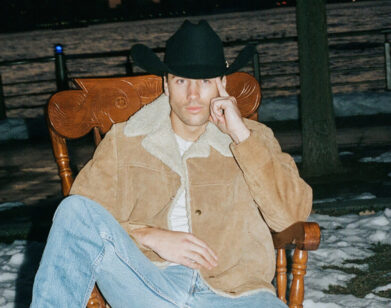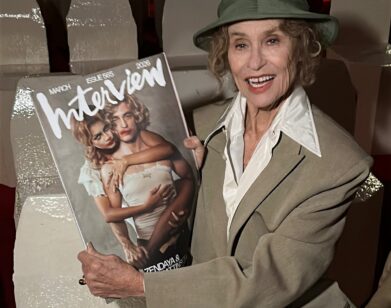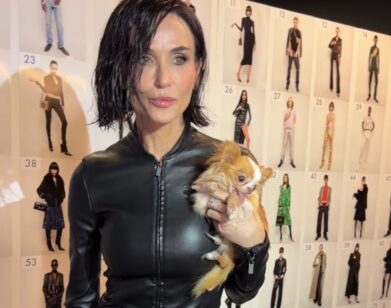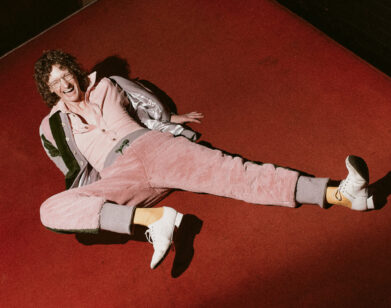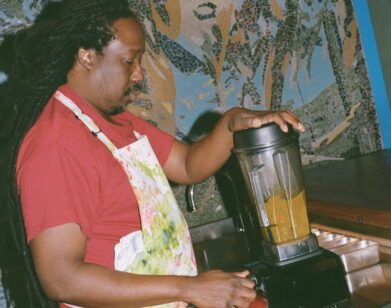Samantha Bee
me and the showrunner, Jo Miller-we’re both in our ‘I don’t give a fuck’ years . . . We’re like, ‘Well, this is our only chance to make a TV show. Let’s just make it how we want it.’ And so we are. SAMANTHA BEE
Even before Samantha Bee premiered her new weekly late-night show, Full Frontal With Samantha Bee, on TBS in February, the advertising tagline—”Watch or you’re sexist”—probably gave us everything we needed to know about what was to come. In a way, it was a promise—to make must-watch television—on which she immediately, and hugely, delivered. But the irony of the demand—the threat, even—was, too, a kind of commitment: to play with our politically correct times, when to be called sexist is perhaps a greater offense than the rampant sexism that very often begs for it and brackets it. I mean, we had to know it was going to be good. We already knew it would be searingly funny.
In Bee’s 12 years as a correspondent on The Daily Show With Jon Stewart, the longest such tenure on the show, she regularly filed “fake” news reports in satirical send-ups of current events. She also helped to establish the show’s staple droll, sarcastic interview style, which has so often proved effective in getting interviewees to say the most imbecilic things to hilarious result. But in her new format, operating as the host of her own news show—whether she is reporting on the election, on the Republican response to Obama’s Supreme Court nominee, or on abortion restrictions in Texas (that “dive up your uterus”)—Bee is seemingly even more comfortable, in ever greater control, and even more devastating. She’s also clearly having the time of her life.
Bee was born in Toronto in 1969 and studied briefly at McGill and the University of Ottawa before coming home to spend some time at the George Brown Theatre School. She did sketch comedy before signing on with Stewart and the Daily Show and moving to New York. She and her husband, fellow Daily Show alum Jason Jones, are both dual citizens and have both made careers poking fun at politics, although, neither has voted in the States before this year. As Bee tells another great Toronto comedian, Catherine O’Hara, this is a good year for new beginnings.
SAMANTHA BEE: This is the most exciting thing that’s happened to me in a really long time.
CATHERINE O’HARA: I was getting nervous—you’re the best interviewer, the queen of confrontation, and the heavyweight pugilist in the world of TV. And I was thinking, “What could I ask that would make you squirm?”
BEE: Pretty much anything. I’m good at asking other people questions, but I’m not really good at answering questions.
O’HARA: Do you cajole your subjects before you interview them?
BEE: I do very consciously set the table for people. I think it’s just better and nice to do that. Nobody wants to have things blurted at them. It’s weird how you can make people feel comfortable, and then ask them an uncomfortable question, but it doesn’t ruin their day.
O’HARA: I would think that, after all you’ve done, most of them must know what they’re in for?
BEE: They do. They don’t mind that much. I think that, as long as they have a chance to get their point across, and as long as they say what it is they want to say, they don’t really care. They know that I’m going to make jokes about it. But if they feel like they’ve been heard, it’s okay for them.
O’HARA: I just watched the episode in which you interviewed Dan Flynn, a Texas State Representative, and you were asking him about the state’s regulations for abortions. And, although you were hitting hard, justifiably, he looked like he was enjoying it.
BEE: He was. It’s so crazy. We had a great conversation. I hope that he feels okay about it. Because, look, I have my own opinions—100 percent—but he feels really strongly about his position; we’re never going to agree. And yet we were able to have a pretty pleasant conversation. And I think he said what he meant to say.
O’HARA: Yeah, you allow people to represent themselves, and they’ll either look smart or foolish on their own; you don’t have to do much for them.
BEE: If you’re going to take a strong position, like the one he takes, you might as well talk about it and defend your beliefs. And if you get mad about how your voice sounds when it comes out of your own mouth, it’s not really my fault. Go ahead and be yourself.
O’HARA: Growing up in your home, were you encouraged to give your opinion and question things?
BEE: I was brought up to question things, but I was always a really quiet and shy child. It’s very Canadian of me—or maybe it’s more the Catholic schoolgirl in me—but I always really want to do a good job. I want to get a gold star. And I know that there are places that I need to go in order to get the story right. I’d rather do it right than have to do it twice. It actually comes more from work ethic than a place of pure confidence, like, “I don’t want to fail at this—let’s get an A.” Which is so silly. We are definitely trying to follow our passion and our curiosity here. We don’t want to flinch too hard; we want to ask the questions that we want to ask. So many of us—me and the showrunner, Jo Miller—we’re both in our “I don’t give a fuck” years. I’m 46, she’s 48 or something. We’re like, “Well, this is our only chance to make a TV show. Let’s just make it how we want it.” And so we are. That’s what we’re doing.
O’HARA: I was reading some of your interviews online, and you dared to say something vaguely encouraging about Hillary Clinton, and that opened up a world. I mean, we’re seeing this year how many angry, frustrated people there are in the country, which is really sad and scary to me. And we know they’ve been out there in the comment world forever-online, anonymous trolls. But I wonder if knowing that no matter what you say is going to be jumped on, does that inhibit you? Or does that free you up?
BEE: The freedom that I feel is because I never read the comments. I actually don’t even read the article. I don’t read anything about myself. I read two reviews of the show, and that’s it. It’s almost pathological. I realize it doesn’t make any sense. But I will get my feelings hurt, and I can’t care. There’s always going to be someone who hates you. There’s always going to be people who love you. It’s a risk in either direction.
O’HARA: I don’t take either of them seriously.
BEE: I don’t take either seriously. I love that people like the show. I’m totally gratified by that, but I just don’t read it. It’s better that way. We do have a web thing where our writers write internet comments, and they mix them with actual ones from the web, and I try to determine if they’re real or fake. I’m pretty good at it. But people are horrible. Even the tiny number that I read, just for this web video … People call me a turd and then there’s pieces-of-shit emojis. It’s just crazy.
O’HARA: I remember the first time Hillary was running for president, reading the comments, honest to God, it made me cry to read the vitriol.
BEE: Can you imagine being a human being who sits in your home and writes the worst things about other human beings and puts it out in the world?
O’HARA: That’s what this kind of election has revealed, just how many people there are out there who feel that way.
BEE: It’s dark.
O’HARA: You’ve created a lot of your own work, haven’t you? What was your first break?
BEE: A lot of comedy is really DIY. You’re kind of doing it yourself.
O’HARA: I’ve always attached to other groups and gone along.
BEE: You’ve got to have gumption. You’ve got to be willing to stand up on the stage for no money for ten years.
O’HARA: How did the Atomic Fireballs happen?
BEE: It was a sketch group. They were actually formed before me. I was doing sketch comedy with another group, and someone dropped out of their group, so they needed a sub. And we became immediate fast friends. One of them is now on this show.
O’HARA: There’s nothing like having a history with someone, when you’re in a foreign land.
BEE: I’m telling you … I’ve hired so many of my true friends on this show, and I’m being rewarded a million times over for it. It’s fun to be surrounded by people that you love.
O’HARA: Speaking of that, I think you co-created a show with your husband, Jason Jones?
BEE: We did. It’s starting April 11th, The Detour.
O’HARA: I think one of the sexiest things a couple can share is laughing. Is that what attracted you to each other?
BEE: Yeah. We’ve always worked together, first in regional children’s theater, which is the way most couples meet.
O’HARA: Sexier than any kind of theater.
BEE: The sexiest form of theater, playing a costume character in Thunder Bay [Canada], doing a road show with a bunch of people. We’ve always worked together and made movies together for a hundred dollars and all that. I think our first conversation was sitting on an airplane having separate conversations with other people, and we overheard one another say that our favorite show was The Simpsons. That was the initiating spark in our relationship. Our first date, we went to see Waiting for Guffman [1997].
O’HARA: No way! Aw, I hope you agreed on how you felt about it.
BEE: We loved it and made passionate love after. No, I don’t remember that part.
O’HARA: You were thinking of Corky. Okay, they only ask women this, but really only women should be asked this: How do you organize your life? With all your work and doing your show and Detour, and probably writing ten books …?
BEE: I know. I don’t know that we nail it all the time. For one thing, we’re so lucky. When we were both working at The Daily Show, they could not have been more family-friendly. They could not have created better conditions for us to have little kids. Our babies were born, I took time off, I worked five hours a day. If I wasn’t working on anything, I could go home. So our kids had very intense time with us. And we lived just up the street from where we worked, so we were always around. And our kids are a little older now. They’re in school, so we actually have a little bit more freedom. And we definitely keep our workdays normal. We tape Full Frontal at 5:30, so I can come home at, like, seven. It gets complicated, but we’re super-attentive to their needs. We just like being with our kids. We’ve been lucky to be able to customize a life that meets both sets of needs. I’m not saying it’s pretty; I go home and immediately I’m doing laundry. I’m vacuuming. I did get a robot.
O’HARA: Me too! And cooking—I like to cook, too.
BEE: I like to cook, too. But it’s a pretty normal life.
O’HARA: How lovely. How aware of the world do you allow your kids to be?
BEE: Quite aware.
O’HARA: As far as the internet and that kind of crap.
BEE: They actually super don’t care about it. I grew up an only child, so I was so much more adult. My eldest daughter is 10, and I was so much more of an adult than she is. She just doesn’t care for the real world. She’s not interested. She loves her brother and sister; they’re such good friends. They listen to NPR in the mornings, because I love news radio. They have opinions about Donald Trump—all the fourth grade and second grade kids really have strong opinions about Donald Trump. I think a lot of our parent body listens to the same morning news shows, and they all kind of receive it by osmosis. So they know the world, but they don’t watch Full Frontal. Actually, they watched the first episode by accident—my mother-in-law let them watch it. I was like, “You can let them physically watch it, but keep the volume down.” Because I swear a lot. She was like, “Okay,” and turned the volume right up. I came into the room and they were like, “Oh, my goodness.” They were horrified.
O’HARA: There’s a motherly element to what you’re doing, even through your anger … It’s not anger, that’s not fair to say, you’re speaking the truth. I think Jon Stewart had a fatherly thing, as does John Oliver. Even though you’re saying, “This is how horrible things are.” You’re also saying, “But it’s going to be okay.”
BEE: Oh, I like that you’re sensing that. You know, it’s funny. I get angry, and I get it all out on the show, for sure, but I don’t feel like any of the things we’re talking about are going to make the world end. President Trump—God forbid—the country will be okay, I promise. I don’t know exactly what the country will look like, but we will survive it.
O’HARA: These are mad times, but there have been a lot of mad times in the world.
BEE: There have. I feel like before the show launched, the question was, “How are you going to be different from all the other shows?” But it actually just is different; it just has a different feeling, and the tone is completely different. There are many different worldviews. And my platform is there to broaden the viewpoint; that’s important.
O’HARA: I love that you barely stop for laughs because you have so much you want to say. I’m afraid to laugh out loud, because there’s so much information.
BEE: There’s so much that needs to be said. We really only have 21 minutes, so we just go for it. We always rehearse the show fat, at four or five minutes too long. And then we have to take four or five minutes out of it. So when it’s down to 21, it’s so dense and we can’t take out another stitch of anything. We figure people will catch up, or they’ll just enjoy the panorama that we’ve created.
O’HARA: They have DVR, so they can watch it over and over. Are there any subjects that have been either too depressing or overwhelming to take on?
BEE: Definitely. We’re all pitching stories all the time, and often there’s an incredible story, but there’s no satirical take on it at all. There’s no thread for you. People kept pitching a story about the state of Mississippi’s child welfare system. It’s so broken; it’s a disaster. And it’s an important story, but there’s no angle for us to tell that story. Because, in the end, it’s just horribly, devastatingly impactful in children’s lives. There’s no upside to it. There’s no bright spot, there’s no comedy. There’s hypocrisy, yes, but it can’t be told in a comedic way because it’s children. So it’s not funny. That happens a lot.
O’HARA: It’s easier to make fun of things that people can help doing.
BEE: You don’t want to be glib; you want to treat every story respectfully.
O’HARA: Do you feel a responsibility to be the voice of reasonable people who actually have a sense of humor?
BEE: No, I don’t. I feel like we’re just trying to make a show that makes us laugh, and it’s cathartic for us. The hope is that people will go on that journey. The hope is that there are other people like us who like the same stuff we like. There’s a danger zone if you take yourself too seriously. It’s a terrible trap to fall into. I think it’s the death of comedy. So we actually put our heads down and think, “This delights me, let’s just do this.” As a viewer myself, I tend to gravitate toward projects that have a really strong voice of a strong creator. Like, The Sopranos had a strong-voiced creator who created a world. I want to go to someone’s world. I’ll buy it if the world is full of zombies—I’ll live there if you give me a strong enough vision of what that world looks like. We feel kind of the same way about our show; we’re just creating a world that feels strong and it’s good for us, so hopefully it is to others.
O’HARA: Did to hear that poor old Rob Ford died?
BEE: I did hear that. It was bittersweet. I felt sad.
O’HARA: I kept thinking of him because, compared to some in the current election campaign, Ford was so much more innocent. He really was just a poor, goofy guy with maybe a drug habit.
BEE: He was just a bit of a dumb-dumb with a drug problem. Oh, God, what a way to go. We certainly made fun of him. He was asking for it. Come on—he loved it.
O’HARA: He would apologize, which is not something you hear much of in the current campaign.
BEE: I just remember when he talked about his wife’s vagina.
O’HARA: And that was in the middle of denying something else he supposedly did. While he was denying having harassed a woman at work, he said “I get more than enough to eat at home.” I love that about him.
BEE: I’m going to pour one out for Rob Ford tonight.
O’HARA: I know you’re from Toronto, and so am I—you and your husband are both dual citizens, right?
BEE: Yeah. Our kids were born here, so we got them dual citizenship. So we’re all dual citizens now. We want to vote. This will be the first time I’m voting. I’m excited.
O’HARA: I’m dual, my husband’s not. He’s born here and lived here. But my kids are dual citizens; they were born here and have their Canadian citizenship. The year I married my American husband, I won the lottery—and I tried to give it to somebody else, because I was already approved—not the money lottery, the immigration lottery. In L.A. I think they have 5,000 people twice a day, once a month. And it was so much more welcoming than any time I ever went across the border before that.
BEE: It was a very emotional experience for me. Not even for myself, but for the people around us. There were maybe 200 people, and it was so monumental for so many of the people who were in the room with us, my heart was singing. And then they played that really awful country music song.
O’HARA: The one they played for us [sings], “And I’m proud to be an American.”
BEE: Yeah, that’s the one! My ironic sensibility was thinking that it was ridiculous, but I had tears rolling down my face.
O’HARA: It was kind of beautiful, lovely, and welcoming.
BEE: That’s how it should be, because, boy, every other step of the immigration process is terrible.
O’HARA: Do you correct your computer spell check for Canadian spelling? Keep trying to spell flavor and neighbor and color with “o-u-r”?
BEE: There’s some kind of loyalty there. And I definitely have mixed emotions about metric and the imperial system. And my kids have all this math with yards.
O’HARA: Well, the United States is one of the only holdouts, not changing to metric.
BEE: We’re so behind it’s ridiculous. It’s never going to change now; it’s too late.
O’HARA: I understand you’ve got a mentoring program that you and Jo your partner are setting up.
BEE: We’re hoping that it’s up and running by June. We’re starting to receive submissions for it now. We both feel like we’re kind of outsiders. We’re not really outsiders anymore, but that’s how we started. We were outliers, and we made our way into this really strange world, so we’d like to pay it forward. More people need to inhabit this world. And, it goes back to what I was saying before: We only knew for sure that we had 13 episodes when we started, so we were like, “Let’s just go for everything that we want. We’ll get a mentorship program going, we’ll say what we want to say on television, and if it all goes to shit, that’s okay; it’s on us.”
CATHERINE O’HARA IS AN ACTRESS AND COMEDIAN WHOSE FILMS INCLUDE BEETLEJUICE, HEARTBURN, BEST IN SHOW, AND WAITING FOR GUFFMAN. SHE CURRENTLY APPEARS ON THE SERIES SCHITT’S CREEK.

